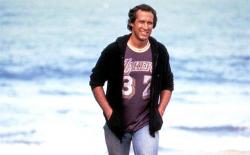Pat Mills is a British comics writer and editor who, along with John Wagner, revitalised British boys comics in the 1970s, and has remained a leading light in British comics ever since. He has been called ‘the godfather of British comics’. His comics are notable for their violence and anti-authoritarianism. He is best known for creating 2000 AD and playing a major part in the development of Judge Dredd. Our girl Amy say down for a chat with him at Sci-fi Weekender 2014.
FTN: In terms of the comic con, as a writer and publisher how does it feel when people come and tell you about their experiences of reading your work?
PM: I suppose I have got used to it over the years; when I was growing up and reading children’s fiction I had no real interest in who the author was, unlike today’s generation. I mean, I recognised certain authors and knew if they were good or rubbish but I had no real interest in who they were and if there had been an opportunity to meet my favourites I would have been too shy and nervous to meet them. In comics it’s become so expected to be able to meet the writers and I personally find it very gratifying to meet the readers. The audience now, comic and science fiction fans in general are polite, twenty years ago they weren’t. With 2000 AD the audience have aged with us, the readers were fourteen then eighteen then thirty, the audience has grown with us. They have kids now, they are very friendly and not remotely controversial, and I almost miss the difficult questions, so feel free to throw some at me.
FTN: I’ll try my best. You are often referred to as the ‘Godfather’ of British Comics. What do you think the British Comic book scene would be like right now if you hadn’t created 2000 AD?
PM: I think there’s no doubt it would be dead. When I started 2000 AD, just around that time in the 70s, people were saying “Comics are dead; it’s just not going to happen”. The same thing is said today; people will tell you that comics are dead and that computer games have taken over. It’s just not true, in exchange for that I say what about the French, French twelve-year-olds read comics and the response to that is always that the French are different. No they are not they are exactly the same, they have computer games they buy comics – they have money for both.
The reason British Comics are dead today is because they are not as good as they should be, they are aimed primarily at fans and they are not aimed at the kid in the street. Some comics, X-Men for example, you need a degree in the subject just to get into them. Often the problem is that comics don’t obey the rules, the rules are how to tell the story and it’s not that difficult. If I have any particular gift it’s that I just listen to what the reader wants and the reason I do that is because I have produced more then my fair share of crap stories; you learn the hard way. In a comic story you have to have a pro-active hero or heroine, you don’t want a hero who says ‘you go’ or a hero who just points their finger and fixes everything. Spider-man by Stan Lee is a classic example of a good hero, he struggles with his costume, his Uncle dying, there are challenges, it reflects real life and that is what we all look for.
“The reason British Comics are dead today is because they are not as good as they should be, they area aimed primarily at fans and they are not aimed at the kid in the street.”
A lot of modern comics break these rules, often wilfully, and some comic fans enjoy these rules being broken. It’s the Art house syndrome, the French idea that the smaller the audience, the better the film. If I had a Vertigo book that sold 10,000 copies they would be crazy about it, they normally don’t go anywhere near that. Whereas with Punisher 2099 it sold one million copies, to be fair anyone could have written it, it just happened to be my good luck. Did it do my career any good? No, it probably did it some harm, actually. The thinking is perverse; what we actually want is for all comics to be selling a million copies.
FTN: One of your big passions is children’s comics particularly girls’. Do you think there is a space in today’s market for children’s comics?
PM: Reviving Girls’ comics is a big thing of mine, the biggest kick I ever had was quite recently when my wife and I did a straw poll, we sent out some stories to kids around the age of eleven from the seventies comic Misty, these eleven-year-olds got it. I mean a good story is a good story; two hundred years from now people will still be in love with Harry Potter. The thing that gave me the biggest kick was that they had no idea who I was; they just read it and said this is a good story. When can I get the next one?
These days you get comic professionals who build an image around themselves, they have to make a living but for me the real accolade is when someone says “Oh I read your story the other day, who are you?” Often in the early days of 2000 AD they would say “Oh, I never looked at the by line but I liked that story”. That is what I want; none of that image and personality bulls#*it that can give you a distorted perspective.
“Spider-man by Stan Lee is a classic example of a good hero, he struggles with his costume, his Uncle dying, there are challenges, it reflects real life and that is what we all look for.”
FTN: Over the years you have discovered some amazing artists; Simon Bisley (art above) and Clive Langley just to name a few. How do you find and choose them?
PM: First of all, the incentive is if I don’t find a great artist, if I use a bad artist or an average artist, the readers usually blames the script; in other words they see the story, don’t think it’s very good and they just go “I didn’t like that” and often blame the script. If you have a good artist the artwork will either be incredible and exciting or they will be a great storyteller, ideally both. Dave Gibbons is obviously an example of that with Kevin O’Neil a close second (Check out O’Neill’s Marshal Law below), they are both genius storytellers. A lot of great artists I have worked with are not great storytellers.
How I find great artists? Well, for the most part, people are so into stardom that what they really want is Brian Bolland and what I look for is the next Brian Bolland. My new artist, Faye Dalton (check out her work at the very bottom of the page), is just that; she is twenty three and she is such an amazing artist. I am able to keep such great artists because I often try to accommodate what the artist likes to draw, so that they are not just the artist’s paintbrush. That sounds very good but you also pay a price for that, I can think of writers who are majorly against that policy. There are instances where it works, like with Kevin O’Neil on Marshal Law, even the Batman story in Marshal Law is overwritten just with the amount of ideas we threw at it. However, with Accident Man, Martin only did the first series as he felt Accident Man wasn’t violent enough, he went on to do white trash which is pretty violent even for me. The writer-artist relationship is a bit like a director versus a screenwriter, sometimes the writer is director, sometimes the artist is and the dynamic is constantly changing, you are never quite sure where you are.
FTN: If you could pick one artist from each decade of 2000 AD who would you pick?
PM: First decade would have to be Carlos. The 80s, Bisley, that’s easy. The 90s were a bad time for 2000 AD so pass to that. Post Millennium, Clint rescued Slaine from a really bad place. Four years into this decade it has to be Faye, I’m currently trying to package a story for her. No one will admit to it, but it’s a bloke’s world in comics, my ex-wife drew Slaine for a period and one of the reasons she stopped was how unfriendly the male artists were towards her. She was treated appallingly and disrespectfully even though her story was the first to beat Dredd.
FTN: While at 2000 AD you have created some of the most enduring characters in British Comics. Who is your favourite creation?
PM: It has to be Slaine, because he is probably the most rounded character and he is also the one who can be the most challenging. The next story is set of the Isle of Man and there is a causeway north of the Isle of Man that lots of monsters and things will be traveling across.
“No one will admit to it, but it’s a bloke’s world in comics, my ex-wife drew Slaine for a period and one of the reasons she stopped was how unfriendly the male artists were towards her. She was treated appallingly and disrespectfully even though her story was the first to beat Dredd.”
FTN: Which characters appeal most to you as a writer, the ones defined by moral absolutes like Marshal Law or the more morally ambiguous like Slaine?
PM: I suppose in some way I see them all as being moral absolutes. Some people would see Marshal Law as being a bad guy but I see him as a good guy doing a great job. The more superheroes off the streets the better! The cause is very close to my heart.
Slaine I see as having his own moral absolutes within his own world. One of the things with Slaine that is a difficulty is that I hate seeing barbarian characters with a modern sensibility. In the case of Slaine there is one prog where he is present at the massacre of the Romans in Colchester, he is part of the massacre but you don’t see him much. He is there but to me it still feels like a bit of a cop out. The story has to ring true; Slaine would not be begging Queen Boudicca to spare the civilians. I think we have a sophiscated audience who are mature enough to understand the moral intricacies of his world.
FTN: Mr Mills, it has been a pleasure talking to you and on behalf of us all at FTN, thanks for everthing you’ve done for the comic lovers out there and thank you for your time.
PM: You’re very, welcome it was fun!









Nerd Comments